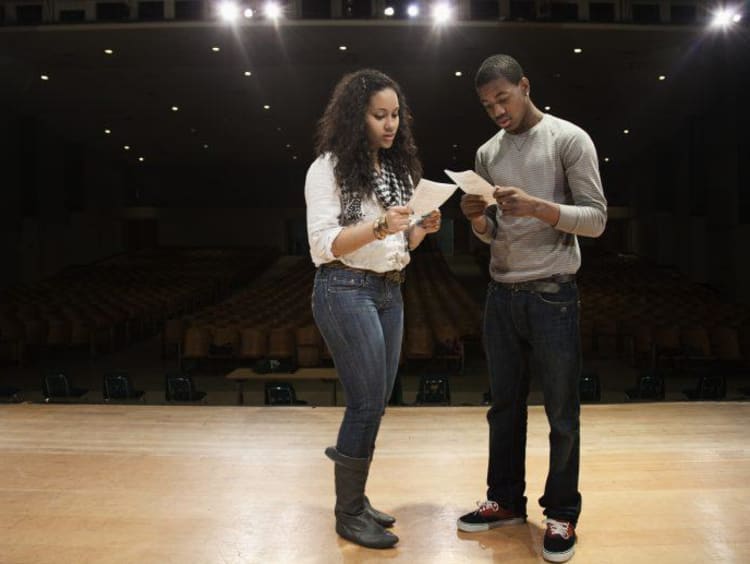How To Prepare for an Audition

Do you dream of becoming an actor, either behind a camera or on a stage? A great first step is earning a theatre degree, and you’ll also need as much experience as possible working on productions and acting in performances. When you graduate, you’ll need to begin doing auditions in order to land your first role.
Auditions are a part of the acting process. Though it can be a long process, it’s the first hurdle you must jump to create a great first impression to the casting directors. A great first audition sets the tone for the rest to come and increases your chances of getting your dream role.
It’s natural to feel some butterflies in your stomach in the days leading up to an audition. Let’s take a look at how to prepare for an audition to ensure you’re ready to impress. You’ll also get some acting auditions tips for beginners.
In This Article:
- 7 Steps To Follow for Audition Preparation
- Acting Auditions: Tips for Beginners
- Earn Your Degree With a Focus in Theatre at GCU
7 Steps To Follow for Audition Preparation
Here are some of the top tips on how to prepare for an acting audition. Although there are no guarantees in the theatre world, following these audition tips may help you make a good impression on the casting director.
1. Read the Work
This may seem obvious, but it is very important to stress that you should read the script fully from front to back. Read it at least once, but it’s even better if you have time to read it multiple times.
You want to be able to answer if they ask you any questions about the script or character development. Reading the full script will also give you an idea on how to play the character and everything you may need to know about them regarding the project.
2. Research the Character
Don’t just look at what you are given at face value. Do your research on the character you are auditioning for. Figure out their desires, fears, motivations and development throughout the scenes. This is how you will really connect and become the character.
While reading the script, pause occasionally to reflect on the material. Ask yourself questions, such as What does this character truly want? What would they be willing to do to get it? If I were having a conversation with this character, what would I notice most about them?
3. The Audience Is on Your Side
Being nervous is common and will happen. When it does, remember that the audience is on your side. The casting directors want you to do well and are hopeful that you will be the one that they are looking for. There should be no fear in facing them and giving it your all.
4. The Three C’s
You should always think of the Three C’s when walking into an audition. Be comfortable, charismatic and confident. When you walk into a room, you must take control and be the center focus. If you walk into a room with that demeanor, then it will also shine through your acting abilities.
5. Test Your Knowledge of Your Lines
Sometimes an actor might think they know the lines forward and backward, but then they stumble when it’s time to speak them out loud. One of the most essential steps in how to prepare for an acting audition is to practice delivering the lines.
Set the script aside and mimic the movements of your character in a scene as you deliver the lines out loud. Make a note of any potentially problematic lines and devote more time to memorizing them. It’s particularly helpful if you have a friend or family member who can read the lines of another character in the scene while you’re practicing your own lines.
6. Look the Part as Much as Possible
Casting directors invite actors to an audition when they think those actors might already have the right look for the character. It’s best to go to the audition with a hairdo and clothes that reinforce that idea.
Of course, you don’t need to go overboard. If you’re auditioning for the part of a pirate, you don’t need to wear a pirate costume. Subtle changes to your appearance, however, can allow the casting director to better imagine you in the part.
7. Keep Auditioning
You’ll receive many no’s in your career before you get a yes. However, it only takes one yes to jump-start your career. Don’t be discouraged by not getting a role or a particular part because eventually, all that practicing and auditioning could pay off.
Acting Auditions: Tips for Beginners
The audition tips listed above can help an actor of any experience level as they prepare for an audition. However, there are also a few audition tips that can help beginners in particular. Take a look:
- Think of an audition as a job interview. For any job interview, you would take the time to research the company, learn about the expectations of the position and prepare responses to common interview questions. An audition is similar in that you must thoroughly research the theatrical production. If you’re confident in your grasp of the material, you’ll be more likely to convey an aura of confidence as an actor.
- Be punctual. Plan to arrive at least 15 minutes early. This will give you enough time to complete any necessary paperwork and introduce yourself to people. You’ll also be able to catch your breath and center yourself so that you can focus on making a good impression during the audition.
- Know when the audition starts. The audition might not officially begin until you start delivering a monologue, but the real audition begins as soon as you enter the building. In other words, you’ll be assessed on more than your ability to play the part; you’ll also be assessed on your real-life personality. Smile and make eye contact with everyone you meet, and be kind to everyone. Casting directors might not want to hire someone whom they think might be difficult to work with.
- Don’t watch the casting directors. While you’re delivering your piece, do not look directly at the casting directors (unless you’re told to do so). They are your audience, not your fellow actors. Pretend you’re already on a stage, working with other actors.
Lastly, it’s important for beginners to know what to do when they make a mistake during an audition. Let’s say your character is supposed to say, “So, I got the job interview, but I think Frankie doesn’t really want me working there.” Let’s say that you mess up the line a bit and say something like, “I’m interviewing for the job, but I don’t think Frankie wants me working there.”
It’s natural to want to apologize to the casting directors for making a mistake and fudging the line. However, you’ll need to avoid the temptation. First, they might not realize you’ve made a mistake, but apologizing will call attention to it. Second, an apology will disrupt the delivery of the next lines in the scene. Instead, do what figure skaters do when they fall during a competition: Pick yourself up and carry on with confidence.
Earn Your Degree With a Focus in Theatre at GCU
If you dream of pursuing an acting career, you’re invited to explore Grand Canyon University’s theatre program within the College of Arts and Media. The Bachelor of Arts in Theatre and Drama teaches core competencies in acting, stagecraft and production. Complete the form on this page to learn more about studying theatre at GCU.
Approved by the dean of the College of Arts and Media on Oct. 25, 2023.
The views and opinions expressed in this article are those of the author’s and do not necessarily reflect the official policy or position of Grand Canyon University. Any sources cited were accurate as of the publish date.


